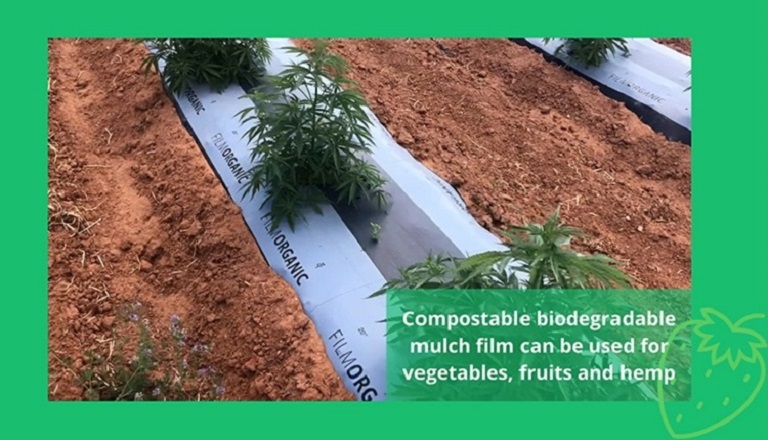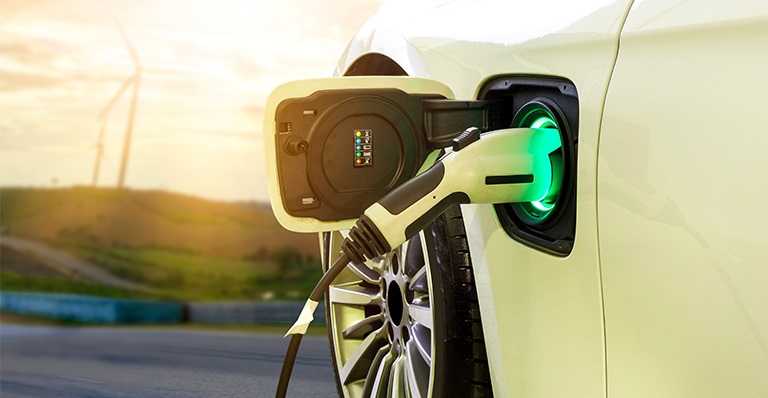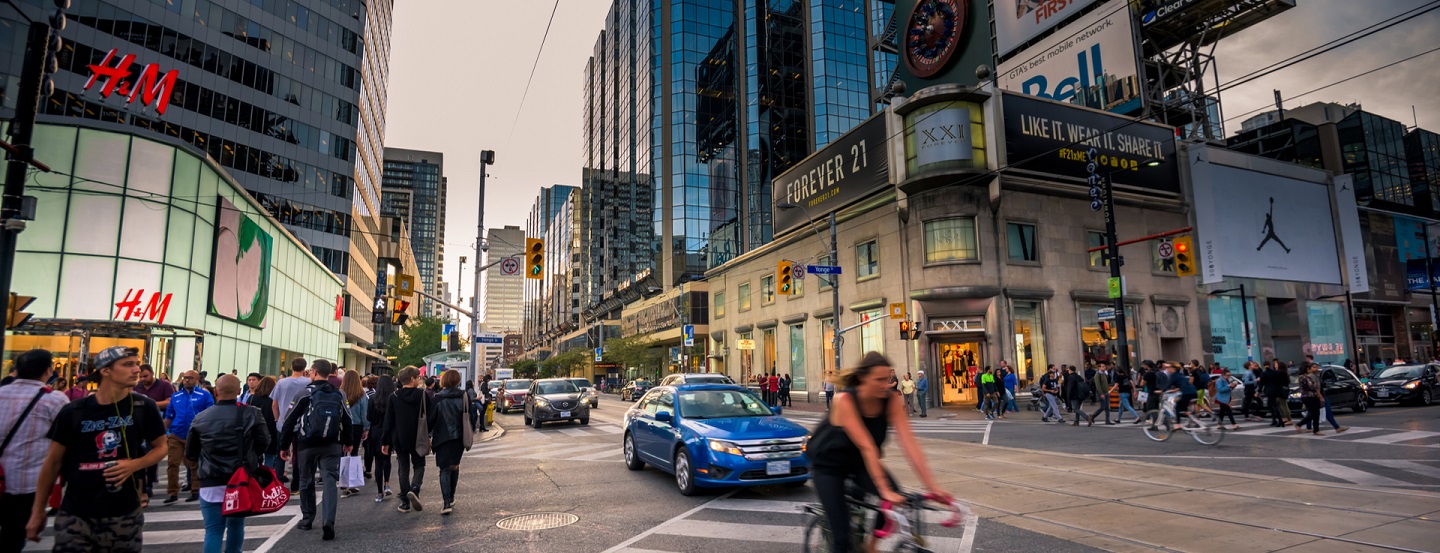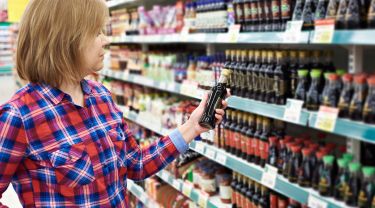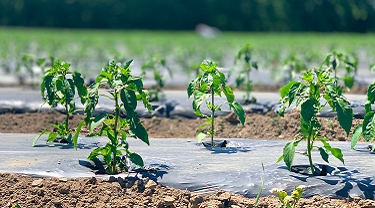
Certified biodegradable ground cover boosts yield, reduces waste
Quebec-based FilmOrganic is an Export Development Canada 2020 Cleantech Export One-to-Watch.
What do you get when you combine compostable biodegradable plastic with farming? Bumper crops with fewer weeds, less after-harvest cleanup and a reduced impact on the environment.
Since 2014, our company, FilmOrganic, has been making mulch film for fruits, vegetables and hemp that can be tilled back into the soil instead of having to be removed at the end of a growing season.
Through our long careers in the plastics industry, we’d both been involved in the manufacturing of polyethylene (PE) mulch film, which isn’t environmentally friendly. Unlike our product, farmers have to remove it from their fields after their crops are harvested. Most of it ends up in a landfill because it’s too dirty to recycle. In some places, farmers will even burn it right on the field.
Keeping the weeds out
The purpose of mulch film is to form a barrier against weeds. It creates a micro environment where there’s no competition for all the nutrients and water that the crop needs. Biodegradable mulch film that can be tilled back into the soil has been around for more than 20 years. Some of the biggest plastics producers in the world have experimented with it and have had mixed success. The main problem was creating a film with a lifespan that was long enough to last the growing season of specific crops before it started to biodegrade, then biodegrade quickly enough to avoid being a nuisance for future plantings.
FilmOrganic is the only company to provide a certified compostable, biodegradable mulch film with a predictable lifespan. By using multiple blends of plastic and different manufacturing processes, we’ve created mulch film with lifespans ranging from two to three months—for lettuce and other vegetables—up to eight to 12 months for growing strawberries. By contrast, our major competitors never change the blend of materials in their biodegradable films and sell based on thickness alone. Thickness, in itself, isn’t a predictor of lifespan.
Farmer feedback
Instead of simply launching a biodegradable product, we spent a lot of time on farms to better understand what growers need. Those requirements included understanding the impact of different:
- Soil types;
- Crops;
- Farming practices;
- Climates.
But going to one farm wasn’t enough. The same product can be applied on two neighbouring farms, where the same crops are planted in the same type of soil, but the product works fine on one farm and breaks down too fast on the other. We needed to be there all the time to understand why and make adjustments to our formulas and manufacturing processes.
Export strategy
After three years of working closely with growers and learning about their requirements, we’re now exporting our knowledge throughout the United States (U.S.) about how to improve crop yield and revenue while reducing plastic pollution at the same time.
We launched our export strategy slowly by taking what we’ve learned on farms in Quebec and Ontario and initially working with about 30 growers in New Jersey, (U.S.). We serviced that area extensively. If there was an issue, we were there in 24 hours, to provide the best service on any item, as if we were a local supplier. We made some early mistakes in terms of fitness for use, but that was OK because we’d developed very good relationships with the growers. They were patient with us because they also had a vested interest in making the product work and they didn’t have to take a huge amount of risk in doing so.
As we moved south into different growing regions in the U.S., we learned even more about how the different climates and soil types could affect the performance of the product and we continued to make adjustments.
Initially, we were selling direct into the U.S. We wanted to be selling through distributors and this happened when distributors actually reached out to us–first. The growers we were selling to in the U.S., specifically requested our products from their distributors. Through that distribution network, we discovered new markets. One of those markets was hemp. We got our largest order ever from industrial hemp farmers in Colorado. From that point, we followed the money, selling to hemp farmers wherever they were, including Oregon and Kentucky.
Our experience with hemp helped refine our export strategy to focus on crop families rather than regions. We took our fitness for use learnings and focused them on four crop families: hemp, mixed vegetables, strawberries and watermelons. We also realized we weren’t just exporting a product; we were exporting knowledge. We can help growers identify problems with their weed barrier and come up with the right solutions.
Higher cost versus higher yield
FilmOrganic’s products are about twice as expensive as standard PE mulch film, but the benefits of using it go beyond reducing pollution. On a 100-acre farm, it can take one to two weeks at the end of the season to remove non-compostable, biodegradable mulch film from the field. That’s time and labour that could be added to the growing season instead.
For example, one of our best customers in New Jersey had converted about 50% of his fields to FilmOrganic products. We’d approached a neighbouring farm about using our film, but the owner wasn’t interested. Then one October, we approached the neighbour again and he ended up switching his entire farm to FilmOrganic. Why? At the end of the season, he saw our initial customer picking peppers with his crew instead of picking up plastic and throwing it away like he was doing. Our initial customer was increasing his revenue instead of spending time and money removing plastic garbage.
How EDC helped
We first got connected with Export Development Canada (EDC) at a networking event hosted by Écotech Québec. EDC helped us first with receivables insurance and then payables insurance. EDC has also helped us secure more working capital with our bank by providing guarantees for our line of credit.
EDC has helped FilmOrganic establish credibility in the marketplace by providing security to our suppliers. We’re also able to sell to customers that we couldn’t sell to before because of the size of the orders. We’re able to give customers credit and that has helped us reach different sets of customers. We’ve been able to expand our business to where we are today, thanks to EDC.














